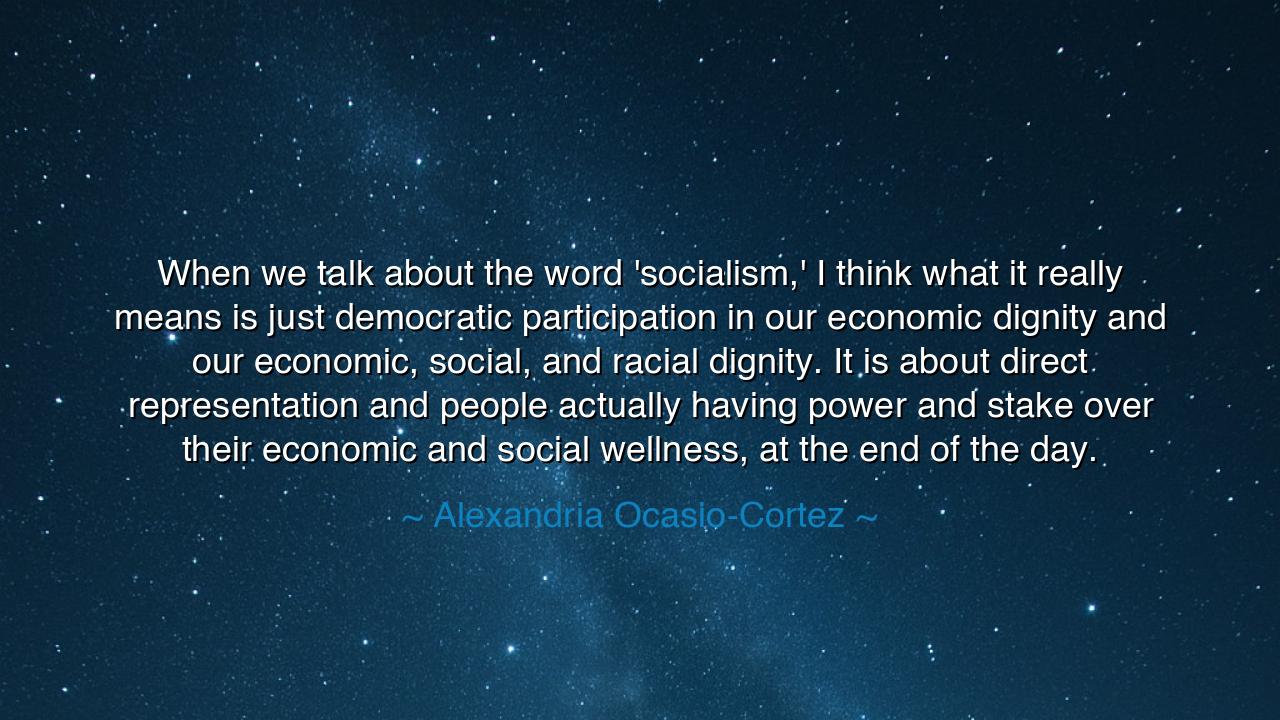
When we talk about the word 'socialism,' I think what it really
When we talk about the word 'socialism,' I think what it really means is just democratic participation in our economic dignity and our economic, social, and racial dignity. It is about direct representation and people actually having power and stake over their economic and social wellness, at the end of the day.






The words of Alexandria Ocasio-Cortez carry the fire of renewal: when we speak of socialism, she declares, we speak not of tyranny or chains, but of democratic participation—a people rising to guard their economic dignity, their social dignity, their racial dignity. Her vision is of a world where power is not hoarded by the few, but shared by the many, where men and women stand not as beggars at the gates of wealth, but as rightful stewards of their own well-being.
This truth is ancient. For what is representation if not the echo of every voice in the halls of decision? What is dignity if not the recognition that each soul, no matter their station, bears the mark of worth? Ocasio-Cortez reminds us that the core of these ideas is not the machinery of policy but the essence of justice: that people must have a stake in the shaping of their lives, lest they live as shadows in a land that should be their own.
History offers us lessons here. In the great struggles of the laboring classes during the Industrial Age, men, women, and even children rose from the soot of the factories and demanded more than survival. They sought fair wages, safer conditions, and the right to stand as human beings rather than as cogs in a merciless machine. Out of their courage grew the movements that secured the forty-hour work week, the banishment of child labor, and the first foundations of economic dignity for millions.
Yet the struggle is unending. For just as ancient kings cloaked their power in divine right, so too do modern lords cloak theirs in markets and money. Ocasio-Cortez speaks to pierce this illusion, to remind us that true power belongs to the people, and that democracy must extend beyond the ballot box into the fields of labor, the streets of community, and the hearts of every citizen.
Therefore, let this wisdom be carried forward: that socialism, rightly understood, is not a chain but a covenant. It is the demand that no one be cast aside, that all partake in the wealth of the world they help create, that dignity not be a privilege but a birthright. For when people share in their own governance, both in life and in labor, they walk not as servants but as sovereigns—and that is the true destiny of a just society.






NTKhang Nguyen Trong
This statement reframes socialism not as control, but as inclusion. It focuses on power in the hands of ordinary people, not elites. But I wonder—does this vision depend on cultural change before political change can happen? People need to believe in collective good over individual gain, which feels like a huge shift. How do we build that mindset in societies rooted in competition?
TKThu Kieu
I find this definition refreshing because it ties economics to social and racial dignity, which are often treated as separate issues. It’s a reminder that inequality isn’t just financial—it’s about voice and representation. Still, I wonder how feasible it is to ensure that everyone has a genuine stake in economic decisions. What mechanisms would make that level of participation possible in real-world governance?
CHNg Cog Huog
This quote highlights something profound—the connection between democracy and economic justice. It suggests that freedom isn’t complete if people lack control over their livelihoods. That idea challenges how we define democracy itself. Are we truly democratic if wealth and opportunity are concentrated in the hands of a few? It makes me reflect on how political participation must extend beyond voting to include economic empowerment.
NTNhi Tuyet
I really like how this perspective reframes socialism from a political label into a moral concept about dignity and empowerment. It makes me think—why does the word ‘socialism’ still spark such intense fear or division in some societies? Maybe it’s not the idea itself but the historical baggage attached to it. If we focused more on shared well-being instead of ideology, could the conversation change?
QAnguyen quynh anh
This explanation of socialism feels very grounded and human-centered. It strips away the political jargon and focuses on dignity and participation. I appreciate how Alexandria Ocasio-Cortez connects economics to identity and respect. But I can’t help wondering—can such ideals survive in a system that still values profit above all else? It’s a beautiful vision, but how do we practically balance fairness with economic efficiency?